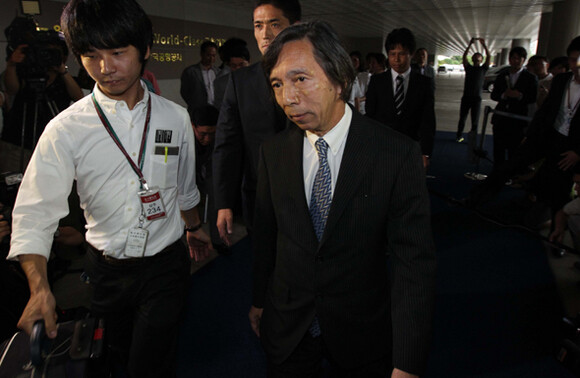hankyoreh
Links to other country sites 다른 나라 사이트 링크
Japan taking Lee’s Dokdo visit “extremely seriously”

By Jeong Nam-ku, Tokyo correspondent
The Japanese government reacted with shock to President Lee Myung-bak’s surprise visit to Dokdo on August 10.
The situation, which appears poised to push already strained relations to a breaking point, came out of nowhere. That afternoon, Prime Minister Yoshihiko Noda had been planning to celebrate the House of Councilors’ final passage of a bill raising the consumption tax, something he had staked his political career on.
Hiroshi Nakai, head of the Lower House budget committee and deputy chairman of the Korea-Japan Parliamentarians’ Union, told the Asahi Shimbun that he was “angry that a current South Korean President would do such a thing when his term is nearing its end.”
An official from South Korea’s Ministry of Foreign Affairs and Trade (MOFAT) said Tokyo was taking the situation “extremely seriously.”
After learning of the plans the night before Lee’s visit, Tokyo used various diplomatic channels to press Seoul to cancel the visit. South Korean officials dodged any discussion, sources reported.
Speaking at a press conference Friday morning, Japanese foreign minister Koichiro Gemba said he had gotten “no word” from Seoul, adding, “It didn’t seem yesterday like the South Korean Foreign Ministry had a full grasp of the situation either.”
Tokyo responded to the visit Friday by summoning Shin Kak-soo, the South Korean ambassador to Japan, in protest, and recalling its own ambassador to Seoul, Masatoshi Muto.
But this does not appear likely to be the end of it. Gemba said he planned to call Muto in to discuss appropriate measures in response. Defense Minister Satoshi Morimoto said his own ministry and the Japanese Self-Defense Court did not have any immediate response planned, but would decide on measures in conjunction with the relevant agencies.
In 2010, Tokyo protested vehemently when then Russian President Dmitri Medvedev paid a Nov. 11 visit to the South Kuril Islands, the first Russian head of state to do visit the archipelago, which is the subject of a territorial dispute with Japan. Naoto Kan, who was prime minister at the time, called it “an act of violence” and temporarily recalled the Japanese ambassador from Moscow. But the effects on relations with Russia were temporary, since Medvedev’s main purpose in visiting was as a preemptive measure before resuming territorial negotiations with Tokyo.
Japanese government officials and mainstream media derided Lee’s visit as a “political event” for his own public. But they also expressed profound concerns about the chill on relations at a time when Tokyo needs Seoul’s cooperation in responding to Beijing’s recent military activity and addressing the issue of Japanese nationals abducted by North Korea. The visit appears certain to stir up anti-South Korea sentiment in Japan, making a response from Tokyo unavoidable and leading to a further strain on relations.
Some are predicting that the visit, which comes at a time when relations were already strained over unresolved issues such as World War II comfort women, seems likely to push them past the breaking point.
Many analysts in Japan said the visit would be a boon to the country’s conservatives and right-wingers. The Noda administration, which has a weak support base to begin with, is susceptible to public pressure to take an aggressive stance. A hint of this was seen when Tokyo belatedly broke its silence on Seoul’s description of Dokdo as South Korean territory in a diplomatic white paper after being criticized by the right-wing Sankei Shimbun newspaper.
Since the Democratic Party of Japan took over in Sept. 2009, it has barred sitting Cabinet officials from making official visits to pay respects at Tokyo’s Yasukuni Shrine. Now two of them, including land minister Yuichiro Hata, have announced plans to go there on Aug. 15, the anniversary of the end of the Pacific War. Meanwhile, the country’s right wing looks set to take advantage of the opportunity to ramp up its claims of dominion over Dokdo and efforts to make the islets a disputed region.
Please direct questions or comments to [englishhani@hani.co.kr]

Editorial・opinion
![[Correspondent’s column] The real reason the US is worried about Chinese ‘overcapacity’ [Correspondent’s column] The real reason the US is worried about Chinese ‘overcapacity’](https://flexible.img.hani.co.kr/flexible/normal/500/300/imgdb/original/2024/0510/5217153290112576.jpg) [Correspondent’s column] The real reason the US is worried about Chinese ‘overcapacity’
[Correspondent’s column] The real reason the US is worried about Chinese ‘overcapacity’![[Editorial] Yoon’s gesture at communication only highlights his reluctance to change [Editorial] Yoon’s gesture at communication only highlights his reluctance to change](https://flexible.img.hani.co.kr/flexible/normal/500/300/imgdb/original/2024/0510/7717153284590168.jpg) [Editorial] Yoon’s gesture at communication only highlights his reluctance to change
[Editorial] Yoon’s gesture at communication only highlights his reluctance to change- [Editorial] Perilous stakes of Trump’s rhetoric around US troop pullout from Korea
- [Guest essay] Preventing Korean Peninsula from becoming front line of new cold war
- [Column] The state is back — but is it in business?
- [Column] Life on our Trisolaris
- [Editorial] Penalties for airing allegations against Korea’s first lady endanger free press
- [Editorial] Yoon must halt procurement of SM-3 interceptor missiles
- [Guest essay] Maybe Korea’s rapid population decline is an opportunity, not a crisis
- [Column] Can Yoon steer diplomacy with Russia, China back on track?
Most viewed articles
- 1[Correspondent’s column] The real reason the US is worried about Chinese ‘overcapacity’
- 2[Editorial] Yoon’s gesture at communication only highlights his reluctance to change
- 3Yoon rejects calls for special counsel probes into Marine’s death, first lady in long-awaited presse
- 4Korea likely to shave off 1 trillion won from Indonesia’s KF-21 contribution price tag
- 5[Book review] Who said Asians can’t make some good trouble?
- 6Nuclear South Korea? The hidden implication of hints at US troop withdrawal
- 7[Column] “Hoesik” as ritual of hierarchical obedience
- 8Young Koreans vent rage over working hours already all too grueling
- 9When and why did Koreans go from anti-American to pro-US?
- 10Birth of Jesus in Korea